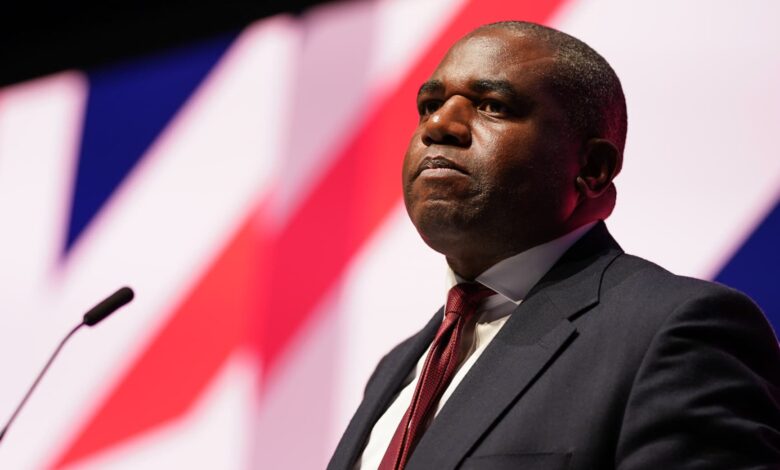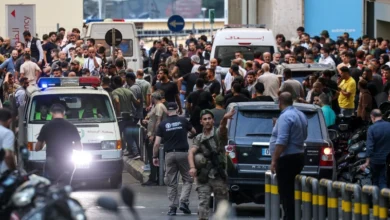UK suspends 30 out of 350 arms export licenses to Israel

The UK is breaking with the Biden administration on a significant part of their hitherto closely coordinated policy toward Israel, announcing it is suspending some arms export licenses to Israel because of a “clear risk” they may be used to commit or facilitate a serious violation of international humanitarian law.
The Foreign Office explained that a two-month internal review raised concerns about the way Israel had conducted itself in the conflict in Gaza, and the decision particularly relates to concerns around the treatment of Palestinian detainees and the supply of aid to Gaza.
No final judgment is allowed on the amount of UK arms export licenses contributing to the devastation in the territory. But the extent of the destruction and number of civilian deaths caused enormous concern, the Foreign Office said. The suspension covers components for military aircraft, helicopters, drones, and targeting equipment, likely raising tensions with the US government.
UK foreign secretary David Lammy said the proposal applied to 30 of the 350 existing arms licenses but would almost entirely exclude all UK components for the F-35 fighter jet program—a significant loophole seen by pro-Palestinian groups.
Officials say components for the F-35 have been excluded because they form part of an international program, and the UK needs to have sole control of those components, which are dispatched to the US. However, they will be included on the rare occasion when the part is sent directly to Israel.

Lammy, aware of the sensitivity of the issue in Israel and the US, underlined that his decision was taken more in sorrow than anger. He added that his conclusion did not amount to a full arms embargo and did not even go as far as Margaret Thatcher’s suspension of licenses in 1982.
But the Israeli defense minister, Yoav Gallant, said he was deeply disappointed by the decision, adding: “This comes at a time when we fight a war on seven different fronts – a war which a savage terrorist organization, unprovoked, launched. At a time when we mourn six hostages who were executed in cold blood by Hamas inside tunnels in Gaza. At a time when we fight to bring 101 hostages home.
Israel’s foreign minister, Israel Katz, said he was “disappointed” by the British decision, adding it sent “a very problematic message to the terrorist organization Hamas and its sponsors in Iran.” The Israeli prime minister, Benjamin Netanyahu, is already under political siege after a general strike and fury that his stance over the Gaza ceasefire terms may have contributed to the Hamas killing of six Israeli hostages last week.
Lammy led the House of Commons to conclude that the suspension decision was taken based mainly on evidence relating, among other things, to the treatment of Palestinian prisoners and limitations on the supply of humanitarian aid into Gaza. He stated that the conduct of the war by Israel in Gaza-widespread destruction of houses-constituted evidence that contributed to the assessment of a clear risk of a severe breach of international humanitarian law.
He seemed anxious for the verdict not to lead to a rupture in relations between England and Israel. Describing himself as a liberal progressive Zionist, he said: “We have not – and could not – arbitrate on whether or not Israel has breached international humanitarian law. This is a forward-looking assessment, not a finding of guilt or otherwise. And it does not preempt any future findings by the competent courts.”
In a summary of its legal advice, the Foreign Office said it found that “Israel could have done more reasonably to facilitate humanitarian access and distribution.” It said, for example, Israel should establish a speedier and more effective system for protecting humanitarian aid from military operations.
It added: “It could also better resource security control procedures and adopt a less restrictive approach to dual-use items, items with both military and civilian uses.” The advice said the quantity of aid needed to be increased, even if it was adequate to be vital to the survival of that population.
On ill-treatment of Palestinian detainees, the summary found “the volume and consistency of these allegations suggest at least some instances of mistreatment contrary to international humanitarian law. Israel has launched investigations into these allegations.
It added that the sufficiency of those investigations could have been clearer, partly because Israel continues to deny access to places of detention for the International Committee of the Red Cross (ICRC). International humanitarian law requires such access “except for reasons of imperative military necessity, and then only as an exceptional and temporary measure.” “Israel has not provided satisfactory reasons,” the FCDO said.
Opposition MPs did not criticize Lammy’s statement, variously describing it as carefully calibrated. Still, Sammy Wilson of the Democratic Unionist party said Hamas would be the only people who this decision would overjoy. Leftist MPs welcomed the move as a beginning or bare minimum, given the loss of 40,000 civilian lives.




